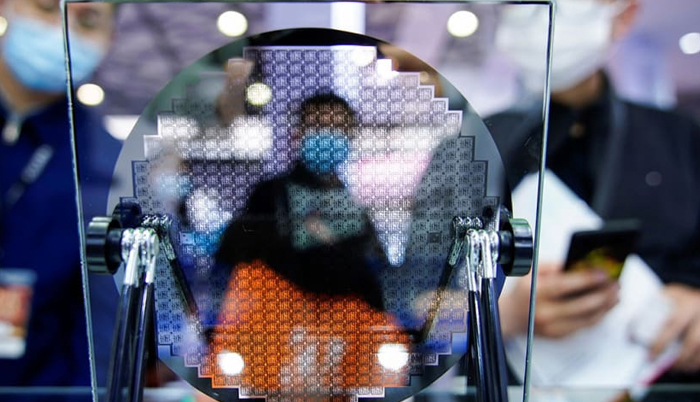![]() Home > Singapore
Home > Singapore
Explainer: What’s Strangling The Global Semiconductor Supply, And Why Singapore Consumers Should Care

Reuters | Visitors look at a display of a semiconductor device at Semicon China, a trade fair for semiconductor technology, in Shanghai, China, on March 17, 2021.
![]() March 22nd, 2022 | 12:37 PM |
March 22nd, 2022 | 12:37 PM | ![]() 333 views
333 views
SINGAPORE
Local consumers may start to notice that certain high-tech goods, ranging from smartphones to cars, are being sold at higher prices, or that stocks for such goods are running out.
The reason for this? The global semiconductor supply crunch which has been exacerbated by the Ukraine crisis and lockdowns in China.
TODAY spoke to experts to find out how geopolitical events and global developments have worsened the chip shortage, and how Singapore consumers will be affected.
WHAT ARE SEMICONDUCTORS
Semiconductors are the brains of modern electronics. They are found in practically all electronic devices ranging from smartphones to computers, advanced medical diagnostic equipment and cars.
Besides silicon, materials key to the manufacturing of semiconductor chips include palladium and rare gas like neon — materials which Russia and Ukraine are major exporters of.
HOW UKRAINE-RUSSIA WAR IMPACTS SEMICONDUCTOR SUPPLY
Assistant Professor Vivek Choudhary from the Nanyang Technological University's Nanyang Business School said that Russia supplies about 40 per cent of palladium used in the global production of semiconductors, while Ukraine supplies about 70 per cent of neon.
“Given the current situation and global sanctions in place, (the conflict) is likely to worsen the situation and also increase the price of the chips,” he said.
During the Budget debate in Parliament last month, Minister for Trade and Industry Gan Kim Yong had already warned that the war between Russia and Ukraine may impact the semiconductor industry and the wider technology goods market, aside from energy costs.
Mr Rakesh Agarwal, partner, advisory, at professional services firm KPMG, had estimated that the semiconductor shortage would last for at least another one to two years due to the evolving Covid-19 variants.
“Certainly, the latest geopolitical developments have posed an impact, which could extend this timeline for a bit,” he said.
OF CHIPS, CHINA AND COVID-19
China’s pursuit of zero-Covid, which is manifested in the recent lockdown of a few key cities, disrupted semiconductor production operations.
Automotive companies including Volkswagen and Toyota, as well as semiconductor suppliers such as Foxconn, were among those immediately hit by the stoppage of work in mid-March, according to Reuters.
Besides impacting production capacity for chips, the lockdowns could also compound supply chain costs in general.
“Lockdowns in China will further reduce capacity and cause a surge in already inflated shipping prices,” said Dr Johannes Schlingmeier, co-founder and chief executive of Container xChange, a global logistics tech company that deals with container leasing and trading.
HIGHER PRICES, DISRUPTED SUPPLIES FOR CONSUMERS
Asst Prof Choudhary said that given the pervasiveness of semiconductors, the supply disruption “has the potential to increase” product prices.
Some costs, especially among lower premium products, may be passed to end consumers, he said.
Mr Agarwal of KPMG echoed this view, saying that consumers may expect to fork out more for “electronics and semiconductor-intensive items in the short run”.
While global automakers have reacted to the chip crunch by prioritising high margin cars and cutting back on low margin ones, how this trickles down to car owners in Singapore might be less straightforward compared to other markets.
Associate Professor Walter Theseira, economics professor at the Singapore University of Social Sciences, said that one of the main ways other markets overcome the shortage is by dealers raising prices above the manufacturers’ price.
But taking into account the vehicle quota system in place here, Assoc Prof Theseira said: “The reduction in global supply is not consequential when you consider that you can’t sell more new cars than there is quota anyway”.
He also said that any upward inflationary pressures on cars may not be as noticeable, as the Certificate of Entitlement makes up a bulk of a car’s price tag.
Manufacturers could also cut back on certain frills; there have been reports of certain car models here being sold without features such as LCD screens and digital locks due to semiconductor supply issues.
Assoc Prof Theseira expects it to continue for the lower profit models for some time.
LONG-TERM BENEFITS FOR SINGAPORE
Despite the short-term woes for consumers here, it is worthy to note that Singapore has in recent years attracted investment to augment its capabilities in the semiconductors industry.
For example, GlobalFoundries, a major chip maker, in June 2021 announced an investment of over US$4 billion (S$5.4 billion) to ramp up its manufacturing capacity here.
In July 2021, Minister of State for Trade and Industry Alvin Tan during a Singapore Semiconductor Industry Association event highlighted that the Republic accounts for 5 per cent of global wafer fabrication capacity and 19 per cent of the global semiconductor equipment market share.
This puts Singapore in good stead to ride on the industry’s growth, which Mr Agarwal of KPMG said is set to continue despite current challenges.
“The industry delivered an all-time high revenue of US$556 billion in 2021 and is expected to reach US$600 billion in 2022... growth of 10 to 15 per cent is expected in the coming decade,” he said.
“Companies that make highly specialised equipment used to build chip foundries will anticipate immense success in the coming years, due to the forecast of increased demand.”
Source:
courtesy of TODAY
by TAUFIQ ZALIZAN
If you have any stories or news that you would like to share with the global online community, please feel free to share it with us by contacting us directly at [email protected]